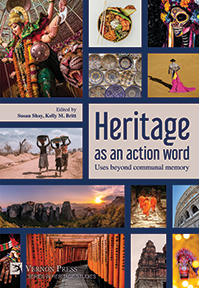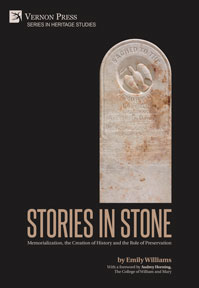Search
Browse
by Publication status
by Subject
Anthropology (26) Art (126) Business and Finance (27) Cognitive Science and Psychology (56) Communication and Journalism (49) Economics (63) Education (70) History (150) Human Geography (22) Interdisciplinary (43) Language and Linguistics (134) Law (16) Music Studies (19) Philosophy (161) Political Science and International Relations (104) Sociology (317) Statistics and Quantitative Methods (21)by Series
Series in Literary Studies (68) Series in Philosophy (59) Series in Education (54) Series in Sociology (45) Bridging Languages and Scholarship (33) Series in Politics (32) Series in World History (32) Series in Language and Linguistics (25) Cognitive Science and Psychology (21) Series in Philosophy of Religion (21) Series in American History (20) Series in Art (19) Critical Perspectives on Social Science (18) Series in Cinema and Culture (16) Series in Critical Media Studies (16) Curating and Interpreting Culture (15) Series on the History of Art (14) Economics (14) Series in Anthropology (13) Series in Business and Finance (13) Series in Music (12) Series in Communication (9) Series in Performing Arts (9) Philosophy of Personalism (8) Series in Law (8) Series on Climate Change and Society (8) Series in Economic Methodology (7) Women's Studies (7) Classics in Economics (6) Series in Economic Development (6) Philosophy of Forgiveness (5) Series in Built Environment (5) Series in Economic History (5) Series in Philosophy of Science (5) Series in Social Equality and Justice (5) Series on the History of Science (4) Serie En Estudios Literarios (3) Serie en Sociología (3) Series in Contemporary History (3) Series in Creative Writing Studies (3) Series in Design (3) The Interdisciplinary Built Environment (3) Serie en Comunicación y Medios (2) Serie en Historia (2) Serie en Música (2) Series in Heritage Studies (2) Series in Innovation Studies (2) Series in Philosophy of Race (2) Serie en Ciencias Políticas (1) Serie en Entorno Construido (1) Serie en Estudios Culturales (1) Serie en Filosofía (1) Serie en Filosofía de la Ciencia (1) Serie sobre Cambio Climático y Sociedad (1) Series in Classical Studies (1) Series in Economics of Technological Change (1) Series in Urban Studies (1)by Language
English Spanishby Author
Browsing with filters
Heritage as an action word: Uses beyond communal memory
Edited by
Susan Shay, Heritage Research Centre, University of Cambridge
and Kelly M. Britt, Brooklyn College and The Graduate Center, City University of New York, United States
Availability: In stock
242pp. ¦ $104 £83 €97
There is no limit to what constitutes heritage. By definition, heritage is the use of the past for present purposes. Yet, to any given group or population, heritage can be a multitude of things and can serve a variety of purposes. Based on shared memory, heritage can be tangible or intangible, boundless in variety and scope: it can be, for example, objects, landscapes, food or clothing, music or dance, sites or statues, monuments or buildings. Importantly, however, heritage also has many and varied uses and powers. It can be used to control, to unite, to engage, and to empower people, communities, and nations. In this interdisciplinary volume, authors from around the world explore how different communities, nations, and groups intentionally and creatively use heritage, both tangible and intangible, in a wide variety of ways to positively address social and environmental issues. Significantly, these studies demonstrate how heritage can be an exceptionally valuable tool for political, economic, and social change. Insightful studies are presented pertaining to heritage as social memory, including the nationalistic political use of heritage, heritage as resistance to political powers, traditional knowledge as environmental science, heritage for legal and community action, heritage for building peace, heritage for Indigenous and minority empowerment, and heritage for exploring the past through phenomenological methods. The goal of this volume is to move beyond seeing heritage as only social memory, a mere interpretation of static past events, people or places, and instead explores critically the variety of ways heritage is engaged in the present and can be in the future.
Stories in Stone: Memorialization, the Creation of History and the Role of Preservation
Emily Williams, Durham University
Availability: In stock
285pp. ¦ $62 £47 €53
*Co-Winner of the Historic Preservation Book Prize 2021* In 1866, Alexander Dunlop, a free black living in Williamsburg Virginia, did three unusual things. He had an audience with the President of the United States, testified in front of the Joint Congressional Committee on Reconstruction, and he purchased a tombstone for his wife, Lucy Ann Dunlop. Purchases of this sort were rarities among Virginia’s free black community—and this particular gravestone is made more significant by Dunlop’s choice of words, his political advocacy, and the racialized rhetoric of the period. Carved by a pair of Richmond-based carvers, who like many other Southern monument makers, contributed to celebrating and mythologizing the “Lost Cause” in the wake of the Civil War, Lucy Ann’s tombstone is a powerful statement of Dunlop’s belief in the worth of all men and his hopes for the future. Buried in 1925 by the white members of a church congregation, and again in the 1960s by the Colonial Williamsburg Foundation, the tombstone was excavated in 2003. Analysis, conservation, and long-term interpretation were undertaken by the Foundation in partnership with the community of the First Baptist Church, a historically black church within which Alexander Dunlop was a leader. “Stories in Stone: Memorialization, the Creation of History and the Role of Preservation” examines the story of the tombstone through a blend of object biography and micro-historical approaches and contrasts it with other memory projects, like the remembrance of the Civil War dead. Data from a regional survey of nineteenth-century cemeteries, historical accounts, literary sources, and the visual arts are woven together to explore the agentive relationships between monuments, their commissioners, their creators and their viewers and the ways in which memory is created and contested and how this impacts the history we learn and preserve.



